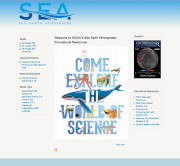
The Necessary Skills Now Network: Integrating Employability Skills Development into Technician Education Across STEM Disciplines
www.necessaryskillsnow.org
For several decades, employers in high-tech fields have complained that entry-level employees often lack "soft skills," the non-technical skills necessary for success in the workplace, including working in teams, problem solving, verbal communication, written communication, dependability/work ethic, and planning/organizing. An Advanced Technological Education (ATE) Coordination Network, the Necessary Skills Now Network fosters the collaboration of community and technical college faculty with business/industry partners to integrate employability skills into technician education programs across the STEM disciplines.
The Necessary Skills Now Network assists community and technical colleges in sharing resources, exploring new teaching methods, and collaborating with employers to help students improve their mastery of soft skills. The Network creates an active "community of practice" to exchange ideas, promising practices, research, and employment trends; provide faculty development workshops and courses to support the adoption of effective teaching methods, instructional materials, and learning environments; and create an online portal of open educational resources to improve the development of employability skills among students in technical associate degree programs. The Network's overall goal is to develop an environment in which many employers and educators collaborate across roles, technology sectors, and geography to build solutions that will give students the full range of skills needed for working productively after they are hired.







